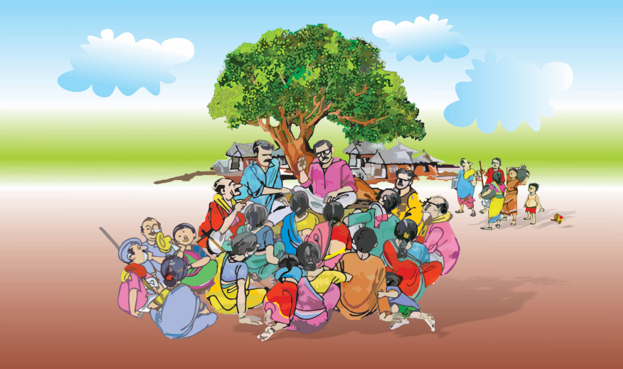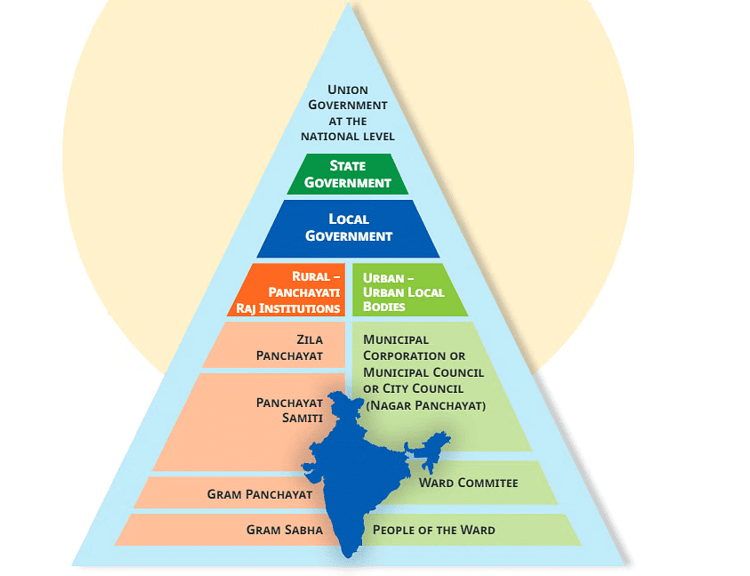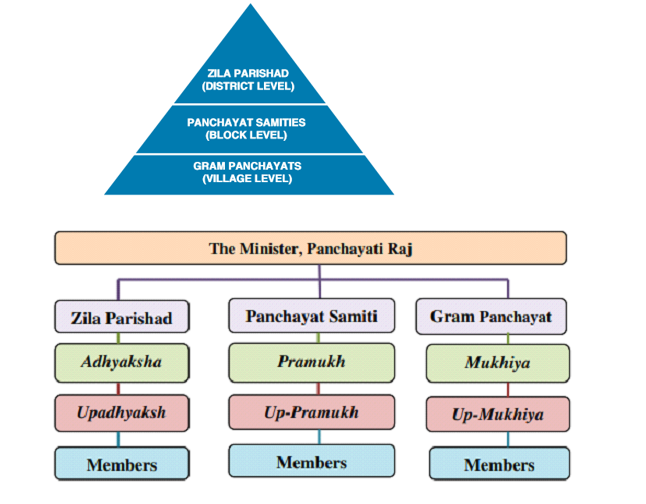Part IX of the Indian Constitution
Part IX of the Indian Constitution, encompassing Articles 243 to 243O, which pertain to the establishment and functioning of Panchayats—the grassroots level of rural local self-government.

Devolution of Powers
The devolution of powers and finances to local levels in India represents a crucial step toward inclusive and responsive governance. While there have been commendable achievements, persistent challenges require strategic interventions.
Strengthening fiscal decentralization, enhancing local capacities, ensuring uniform devolution, and mitigating political interference are imperative for the success of this transformative process.
The journey towards effective devolution is an ongoing one, demanding sustained commitment, innovation, and collaboration to realize the vision of empowered local self-governance.
- Constitutional Provisions: The 73rd and 74th Amendments to the Constitution of India in 1992 mandated the establishment of Panchayats and Municipalities, outlining their powers and functions. This constitutional backing provided a strong foundation for devolution.
- Participatory Governance: Devolution of power encourages citizen participation in decision-making processes. Local bodies are better positioned to understand the unique needs of their communities, leading to more responsive and accountable governance.
- Capacity Building: Devolution of power promotes the building of local leadership and administrative capacities. It allows local representatives to gain valuable experience and skills in governance, fostering a culture of self-reliance.
- Tailored Development: Local bodies can design and implement development programs tailored to their specific requirements. This flexibility enables targeted interventions, especially in areas with unique challenges.

Article 243: Definitions
This article provides essential definitions for terms used in this Part:
- District: A district in a State.
- Gram Sabha: A body consisting of persons registered in the electoral rolls of a village within the Panchayat area.
- Intermediate Level: A level between the village and district levels, specified by the Governor of a State.
- Panchayat: An institution of self-government constituted under Article 243B for rural areas.
- Panchayat Area: The territorial area of a Panchayat.
- Population: As ascertained at the last preceding census.
- Village: A village specified by the Governor for the purposes of this Part.
Article 243A: Gram Sabha
This article empowers the Gram Sabha to exercise such powers and perform such functions at the village level as the Legislature of a State may, by law, provide.
Article 243B: Constitution of Panchayats
This article mandates the establishment of Panchayats at the village, intermediate, and district levels, as determined by the Legislature of a State.
Article 243C: Composition of Panchayats
This article outlines the composition of Panchayats at various levels:
- Village Level: Directly elected members.
- Intermediate and District Levels: Members directly elected; some may be indirectly elected or nominated, as prescribed by the State Legislature.iPleaders

Article 243D: Reservation of Seats
This article provides for the reservation of seats in Panchayats for:
- Scheduled Castes (SCs) and Scheduled Tribes (STs): In proportion to their population.
- Women: Not less than one-third of the total seats, including those reserved for SCs and STs.
Additionally, it allows for the reservation of offices of Chairpersons in Panchayats.
Article 243E: Duration of Panchayats
This article stipulates that:
- Duration: Panchayats shall continue for five years from the date of their first meeting.
- Dissolution: They may be dissolved earlier by a resolution passed by the State Legislature.
Article 243F: Disqualifications
This article specifies disqualifications for membership in Panchayats, which include:
- Age: A minimum age of 21 years.
- Other Disqualifications: As prescribed by the State Legislature.
Article 243G: Powers, Authority, and Responsibilities of Panchayats
This article empowers Panchayats to:
- Legislation: Make laws regarding matters listed in the Eleventh Schedule.
- Functions: Perform functions entrusted by the State Legislature.
Article 243H: Powers to Impose Taxes, Duties, etc.
This article allows Panchayats to:
- Taxation: Levy taxes, duties, tolls, and fees as authorized by the State Legislature.
- Grants: Receive grants-in-aid from the Consolidated Fund of the State.
Article 243I: Finance Commission
This article mandates the establishment of a Finance Commission every five years to:
- Review: Assess the financial position of Panchayats.
- Recommendations: Suggest measures for the distribution of taxes, duties, tolls, and fees between the State and Panchayats.
Article 243J: Audit of Accounts of Panchayats
This article empowers State Legislatures to:
- Audit: Provide for the maintenance and audit of Panchayat accounts.
Article 243K: Elections to Panchayats
This article mandates the establishment of a State Election Commission to:
- Supervision: Supervise, direct, and control the conduct of elections to Panchayats.
Article 243L: Application to Union Territories
This article empowers the President to apply the provisions of this Part to Union Territories with such modifications as deemed necessary.
Article 243M: Exclusion of Certain Areas
This article allows the President to exclude certain areas from the provisions of this Part, such as:
- Scheduled Areas: Areas under the Fifth Schedule.
- Tribal Areas: Areas under the Sixth Schedule.
Article 243N: Continuance of Existing Laws
This article ensures that:
- Existing Laws: Laws relating to Panchayats in force before the commencement of the 73rd Amendment continue until amended or repealed.
- Existing Panchayats: Panchayats existing before the commencement continue until their duration expires.
Article 243O – Bar to Interference by Courts in Electoral Matters
Text of Article 243O of the Indian Constitution:
(a) The validity of any law relating to the delimitation of constituencies or the allotment of seats to such constituencies made under this Part shall not be called in question in any court.
(b) No election to any Panchayat shall be called in question except by an election petition presented to such authority and in such manner as is provided for by or under any law made by the Legislature of a State.
Important judgements related to PRIs in India
Kishansing Tomar v. Municipal Corporation of Ahmedabad & Others (2006)
Citation: (2006) 8 SCC 352
Issue:
Delay in conducting elections to local bodies after dissolution.
Verdict:
- State Election Commissions (SECs) must hold elections before the expiry of the five-year term of local bodies.
- No justification, including law and order problems or reorganization, can delay elections beyond the constitutional deadline.
State of U.P. v. Pradhan Sangh Kshettra Samiti (1995)
Citation: AIR 1995 SC 1512
Issue:
Interference of courts in ongoing Panchayat elections.
Verdict:
- Courts cannot interfere in the electoral process.
- Disputes must be settled only through election petitions, as per Article 243O.
Bhanumati v. State of Uttar Pradesh (2010)
Citation: (2010) 12 SCC 1
Issue:
Abolition of Gram Panchayats during the term for restructuring purposes.
Verdict:
- The State has the power to reconstitute or abolish PRIs in public interest.
- However, such decisions must not be arbitrary and must conform to democratic principles.
Rajendra Singh Rana v. Swami Prasad Maurya (2007)
Citation: (2007) 4 SCC 270
Issue:
Disqualification under the anti-defection law at the local level.
Verdict:
- The Tenth Schedule (anti-defection law) does not apply to Panchayats, but state laws may have provisions.
- Need for disciplinary mechanisms within PRIs to maintain stability.
Sudhakar v. State Election Commission, Maharashtra (2015)
Bombay High Court
Issue:
Mandatory education qualification for contesting Panchayat elections.
Verdict:
- Upheld the State’s power to impose minimum educational qualifications for Panchayat elections.
- Said it is not discriminatory, and falls within the legislature’s powers to ensure effective governance.
Javed v. State of Haryana (2003)
Citation: (2003) 8 SCC 369
Issue:
Disqualification of Panchayat candidates for having more than two children.
Verdict:
- Held as constitutional and not violative of Article 14 or 21.
- State can impose such restrictions for population control and public welfare.
K.K. Krishnan v. State of Tamil Nadu (2005)
Madras High Court
Issue:
Delay in devolution of powers to PRIs.
Verdict:
- The State must transfer 29 subjects listed in the Eleventh Schedule to PRIs.
- Failure to do so violates the 73rd Amendment and weakens decentralization.
S. No. | Case Name | Year & Citation | Key Issue | Judgment Summary |
1 | Kishansing Tomar v. Municipal Corporation of Ahmedabad | (2006) 8 SCC 352 | Delay in Panchayat elections | State Election Commissions must hold timely elections; delay not permitted beyond 5 years. |
2 | State of U.P. v. Pradhan Sangh Kshettra Samiti | AIR 1995 SC 1512 | Court interference in Panchayat elections | Courts cannot interfere; disputes to be resolved via election petitions under Article 243O. |
3 | Bhanumati v. State of U.P. | (2010) 12 SCC 1 | Dissolution/restructuring of PRIs | State has power to restructure PRIs; must not act arbitrarily. |
4 | Rajendra Singh Rana v. Swami Prasad Maurya | (2007) 4 SCC 270 | Defection in PRIs | Anti-defection not directly applicable to PRIs unless provided by state laws. |
5 | Sudhakar v. State Election Commission, Maharashtra | 2015 (Bom HC) | Educational qualification for contesting | Upheld state law requiring minimum educational qualification as valid. |
6 | Javed v. State of Haryana | (2003) 8 SCC 369 | More than two children disqualification | Held valid and constitutional; promotes public welfare and family planning. |
7 | K.K. Krishnan v. State of Tamil Nadu | 2005 (Madras HC) | Devolution of powers to PRIs | State must transfer functions listed in Eleventh Schedule; enforce true decentralization. |
73rd Amendment Act, 1992
The 73rd Amendment Act, 1992 is a landmark constitutional reform in India that gave constitutional status to Panchayati Raj Institutions (PRIs)—the system of local self-government in rural areas.
It added Part IX (Articles 243 to 243O) and the Eleventh Schedule to the Constitution. It came into force on April 24, 1993, which is now celebrated as National Panchayati Raj Day.
Key Features of the 73rd Amendment Act
The 73rd Amendment Act of 1992 is a crucial piece of legislation that strengthened the decentralization of power in India and established a constitutional framework for Panchayati Raj Institutions (PRIs), bringing local self-governance to the rural areas. Here are the key features of the 73rd Amendment Act:
Constitutional Status to Panchayati Raj Institutions (PRIs)
- The Act gave constitutional recognition to Panchayats as institutions of self-government under Part IX of the Constitution (Articles 243 to 243O).
- This made Panchayats an integral part of India’s governance system and provided legal protection to their existence and functioning.
Three-Tier System of Panchayats
- The Act mandated a three-tier system of local governance for rural areas:
- Gram Panchayat at the village level.
- Panchayat Samiti at the intermediate/block level.
- Zila Parishad at the district level.
- This system ensures decentralization and participation from the grassroots to the district level.
Gram Sabha
- The Gram Sabha, a general body consisting of all eligible voters in a village, was given constitutional status.
- The Gram Sabha has the power to oversee the functioning of the Gram Panchayat and can make recommendations for development.
Direct Elections
- Panchayat members are elected directly by the people for all three levels—Gram Panchayat, Panchayat Samiti, and Zila Parishad.
- The direct election process ensures democratic participation at the grassroots level.
Reservation of Seats
- Seats in Panchayats are reserved for Scheduled Castes (SCs), Scheduled Tribes (STs), and women:
- SCs and STs: Seats are reserved in proportion to their population in each Panchayat area.
- Women: One-third of the total seats in each Panchayat are reserved for women, including those reserved for SC/STs.
- Chairperson’s post: The office of the chairperson in Panchayats can also be reserved for women.
Duration and Dissolution
- Panchayats are given a five-year term from the date of the first meeting.
- Elections to Panchayats must be held before the expiry of the five-year term. If a Panchayat is dissolved before its term ends, fresh elections must be conducted within six months.
State Election Commission (SEC)
- A State Election Commission is established in each state to conduct elections to PRIs in a free and fair manner.
- The SEC is an independent body that functions autonomously to ensure the integrity of the election process.
State Finance Commission (SFC)
- The State Finance Commission is constituted every five years to review the financial position of Panchayats and make recommendations for the devolution of funds to Panchayats.
- The SFC’s role is crucial in ensuring adequate financial resources for the functioning and development of PRIs.
Powers and Responsibilities
- The Act empowers Panchayats to prepare plans for economic development and social justice in areas like:
- Agriculture
- Rural housing
- Drinking water
- Education
- Health and sanitation
- Welfare of weaker sections
- Roads, etc.
- These functions are defined in the Eleventh Schedule (which lists 29 functional areas), empowering Panchayats to implement development programs effectively.
Audit and Accounts
- Panchayats must maintain proper accounts and undergo an audit as per the guidelines set by the State Legislature.
- This ensures transparency and accountability in the financial management of Panchayats.
Exclusion of Certain Areas
- The 73rd Amendment does not apply to:
- Tribal Areas covered under the Fifth Schedule (Scheduled Areas).
- Tribal Areas under the Sixth Schedule.
- Union Territories, except as the President may specify.
- Jammu and Kashmir, until Article 370 was abrogated.
Bar on Court Interference (Article 243-O)
- Article 243-O restricts the judicial interference in Panchayat elections, ensuring that elections and delimitation of constituencies cannot be challenged in courts except through an election petition.
Significance of the 73rd Amendment
- Strengthening democracy: The Act has brought about significant political decentralization, empowering local communities to participate in decision-making.
- Increased accountability: Panchayats are now responsible for a variety of developmental functions, leading to better accountability and resource management.
- Inclusive governance: By reserving seats for women, SCs, and STs, the Act has promoted inclusive governance at the grassroots level.
- Promotion of rural development: It provides the framework for better delivery of services (like health, education, drinking water, etc.) and economic development at the local level.
- Articles Introduced by the 73rd Amendment
Article | Content |
243 | Definitions |
243A | Powers of Gram Sabha |
243B–243C | Structure and composition of Panchayats |
243D | Reservation of seats |
243E | Duration and dissolution |
243F–243G | Disqualifications, powers, and authority |
243H–243I | Finance and Finance Commission |
243J–243K | Audit and Elections |
243L–243M | Application to UTs and exclusions |
243N–243O | Continuation of existing laws, bar on court interference |
Exceptions
The 73rd Amendment does not apply to:
- Jammu & Kashmir (until Article 370 was abrogated in 2019)
- Fifth Schedule areas (tribal areas)
- Sixth Schedule areas (Northeast tribal areas)
- Darjeeling Gorkha Hill Council
29 subjects in the Eleventh Schedule
29 subjects listed in the Eleventh Schedule of the Indian Constitution, which are the functional areas devolved to Panchayati Raj Institutions (PRIs) under the 73rd Amendment Act of 1992:
S. No. | Subject |
1 | Agriculture, including agricultural extension |
2 | Land improvement, implementation of land reforms, and land consolidation schemes |
3 | Minor irrigation, water management, and watershed development |
4 | Animal husbandry, dairy, and poultry |
5 | Fisheries |
6 | Social forestry and farm forestry |
7 | Minor forest produce |
8 | Small scale industries, including food processing industries |
9 | Khadi, village, and cottage industries |
10 | Rural housing |
11 | Drinking water |
12 | Fuel and fodder |
13 | Roads, culverts, bridges, ferries, waterways, and other means of communication |
14 | Rural electrification, including distribution of electricity |
15 | Non-conventional energy sources |
16 | Poverty alleviation programmes |
17 | Education, including primary and secondary schools |
18 | Libraries |
19 | Cultural activities |
20 | Markets and fairs |
21 | Health and sanitation, including hospitals, primary health centers, and dispensaries |
22 | Family welfare |
23 | Women and child development |
24 | Social welfare, including welfare of the handicapped and mentally retarded |
25 | Welfare of the weaker sections, and in particular, of the Scheduled Castes and the Scheduled Tribes |
26 | Public distribution system |
27 | Maintenance of community assets |
28 | Welfare of farmers, including support for agricultural co-operatives |
29 | Rural development |
These subjects represent a wide range of functions and services that are to be managed at the grassroots level, empowering Panchayats to contribute directly to the local development and welfare of the rural population.
